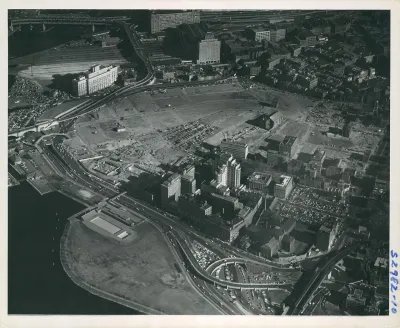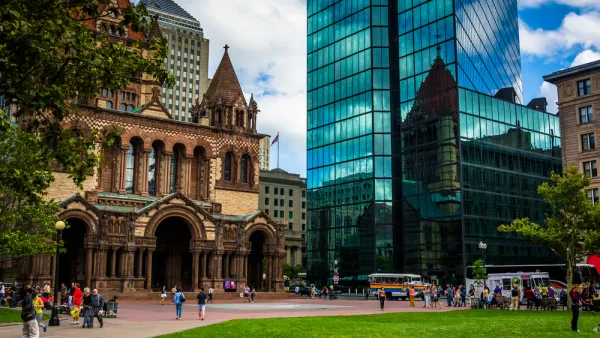Michelle Wu, Boston's new mayor, is ready to finally end the government powers that displaced communities in the mid-20th century.

In February, Boston Mayor Michelle Wu asked the City Council to end five of the city’s 14 active urban renewal plan areas, "with the goal of winding down all of the plans by the end of this year," reports Catherine Carlock for the Boston Globe.
"A powerful urban development tool granted to the then-Boston Redevelopment Authority in the late 1950s, urban renewal has been the city’s primary mechanism to take so-called 'blighted' property by eminent domain, and was key to the wholesale razing of the West End, Scollay Square, and parts of the South End and Roxbury in the 1950s and ′60s," explains Carlock.
Mayor Wu wrote a letter to the City Council explaining the rationale behind the request to end the city's urban renewal districts—connecting the contemporary urban renewal districts to their history as tools of displacement through "slum clearance" and other methods of a previous era of planning. "My administration is committed to putting equity at the forefront of planning and development decisions and the sunsetting of urban renewal in Boston should be viewed through this lens," wrote Wu in the letter.
As noted by Carlock, Wu campaigned on the issue of sunsetting the city's urban renewal districts, along with other larger structural reforms for the Boston Planning and Development Agency, so stay tuned for more reform developments.
FULL STORY: Wu says she’ll wind down Boston’s urban renewal districts. Here’s what that means.

National Parks Layoffs Will Cause Communities to Lose Billions
Thousands of essential park workers were laid off this week, just before the busy spring break season.

Retro-silient?: America’s First “Eco-burb,” The Woodlands Turns 50
A master-planned community north of Houston offers lessons on green infrastructure and resilient design, but falls short of its founder’s lofty affordability and walkability goals.

Delivering for America Plan Will Downgrade Mail Service in at Least 49.5 Percent of Zip Codes
Republican and Democrat lawmakers criticize the plan for its disproportionate negative impact on rural communities.

Test News Post 1
This is a summary

Test News Headline 46
Test for the image on the front page.

Balancing Bombs and Butterflies: How the National Guard Protects a Rare Species
The National Guard at Fort Indiantown Gap uses GIS technology and land management strategies to balance military training with conservation efforts, ensuring the survival of the rare eastern regal fritillary butterfly.
Urban Design for Planners 1: Software Tools
This six-course series explores essential urban design concepts using open source software and equips planners with the tools they need to participate fully in the urban design process.
Planning for Universal Design
Learn the tools for implementing Universal Design in planning regulations.
EMC Planning Group, Inc.
Planetizen
Planetizen
Mpact (formerly Rail~Volution)
Great Falls Development Authority, Inc.
HUDs Office of Policy Development and Research
NYU Wagner Graduate School of Public Service





























